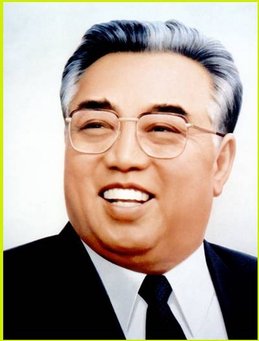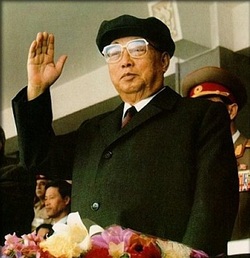Kim Il-Sung, the eternal president of North Korea

Kim Il-Sung, father and the first premier of the Democratic People's Republic of Korea, was, according to the Biography.com article "Kim Il-sung Biography," born on April 15, 1912 in Man'gyndae, Korea. As one would expect, he had a dystopian upbringing that was surrounded by conflict. When he was thirteen, he and his family fled to Manchuria (China) to escape Japan's brutal occupation over Korea; in the 1930's, as the Japanese Army was sweeping across eastern Asia, Il-Sung joined the Korean guerrilla resistance in an attempt to stop the powerful empire (Biography). Consequently, this led to him being noticed by Soviet officials, and thus he was sent to the USSR for training. It was there he joined the communist party (Biography).
Il-Sung continued to fight as a guerrilla until World War II included the Soviet Union. He was then picked up by the them as a Major, and even had his own contingent of troops. He fought for them until the Japanese surrendered in 1945, and then went home to Korea (Biography). Upon returning home, he found that the north part of Korea was occupied by the Soviets and the southern part was by the US. Being the product of Soviet training, he aimed to bring about a new, communist government to northern Korea, and thus he and fellow communist Koreans succeeded. In 1948 he was made the first premier of the Democratic People's Republic of Korea, and a year later the head of the Korean Worker's Party (Biography). He had finally been able to bring a sense of piece to a land that had been devastated by war and tyranny for generations, and for once Korea's future looked bright.
Not surprisingly though, he then went and started a war a year later throwing the Korean peninsula into yet another state of dystopia. Feeling the need to reunify the Korean peninsula by force, he attempted to invade South Korea, thus starting the Korean War. It was only through Chinese, and indirectly Soviet, aid that the US and United Nations did not permanently capture the north (Biography). Feeling the sting of defeat, Il-Sung turned his attention to domestic matters by proceeding to assume more power. Once he had taken entire control, he set about his initiatives to create militaristic society that practiced juche, or self reliance (Biography). This meant that the Democratic People's Republic of Korea would attempt to operate its economy with little to no outside trade, seemingly similar to a utopia.
Il-Sung continued to fight as a guerrilla until World War II included the Soviet Union. He was then picked up by the them as a Major, and even had his own contingent of troops. He fought for them until the Japanese surrendered in 1945, and then went home to Korea (Biography). Upon returning home, he found that the north part of Korea was occupied by the Soviets and the southern part was by the US. Being the product of Soviet training, he aimed to bring about a new, communist government to northern Korea, and thus he and fellow communist Koreans succeeded. In 1948 he was made the first premier of the Democratic People's Republic of Korea, and a year later the head of the Korean Worker's Party (Biography). He had finally been able to bring a sense of piece to a land that had been devastated by war and tyranny for generations, and for once Korea's future looked bright.
Not surprisingly though, he then went and started a war a year later throwing the Korean peninsula into yet another state of dystopia. Feeling the need to reunify the Korean peninsula by force, he attempted to invade South Korea, thus starting the Korean War. It was only through Chinese, and indirectly Soviet, aid that the US and United Nations did not permanently capture the north (Biography). Feeling the sting of defeat, Il-Sung turned his attention to domestic matters by proceeding to assume more power. Once he had taken entire control, he set about his initiatives to create militaristic society that practiced juche, or self reliance (Biography). This meant that the Democratic People's Republic of Korea would attempt to operate its economy with little to no outside trade, seemingly similar to a utopia.

Shockingly, he was able to make it work into the early 1990's. He had created a dystopia, but for many people it was a utopia of prosperation. In true dystopian fashion, the working class was supporting the upper class, doing so under the impression that it was for the betterment of North Korea. It was also during this time that he resigned from the office premier and took the position as president of North Korea in 1972. A few years later, he began to grant significant promotions to his son, Kim Jong-Il, thereby rooting him as his successor (Biography). It was good planning on his part too, due to the fact that as the north's economy began to slip, so did his health. Il-Sung remained as president of North Korea and the head of the Korean Worker's Party until his death on July 8, 1994 in Pyongyang. Upon his death, Kim Jong-Il had the constitution of North Korea revised, thus making Kim Il-Sung the eternal president (Biography). For a full biography, click here
However, even beyond death his legacy is still in effect. In the Time.com article by Josh Sanburn titled "Top 25 Political Icons," Kim Il-Sung is ranked as the 21st most influential political icon in history. Beyond that, the Associated Press / Huffinton Post article "North Korea Honors Founder Kim Il Sung's Birthday With Flags and Flowers" states that the anniversary of Kim Il-Sung's birthday is North Korea's largest holiday. The day has been dubbed "The Day of the Sun" and is celebrated by the decorating of Pyongyang with the flowers that represent both Kim Il-Sung and his son, Kim Jong-Il; it even grants the citizens of North Korea leisure time to do with what they wish (Post). Therefore it is possible to see how large an effect this one man had on a country.
However, even beyond death his legacy is still in effect. In the Time.com article by Josh Sanburn titled "Top 25 Political Icons," Kim Il-Sung is ranked as the 21st most influential political icon in history. Beyond that, the Associated Press / Huffinton Post article "North Korea Honors Founder Kim Il Sung's Birthday With Flags and Flowers" states that the anniversary of Kim Il-Sung's birthday is North Korea's largest holiday. The day has been dubbed "The Day of the Sun" and is celebrated by the decorating of Pyongyang with the flowers that represent both Kim Il-Sung and his son, Kim Jong-Il; it even grants the citizens of North Korea leisure time to do with what they wish (Post). Therefore it is possible to see how large an effect this one man had on a country.
To see just how significant Kim Il-Sung was, here is a video from a North Korean television station covering the nation's reaction to his death. The state of dystopia that the nation is thrown in not only shows just how highly revered he was, but how little people could see beyond him.
